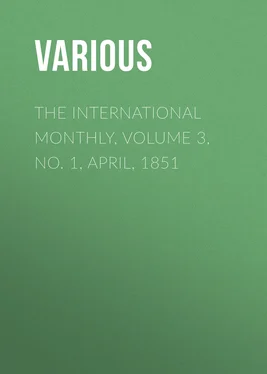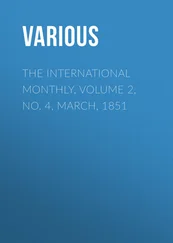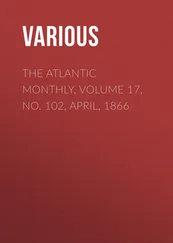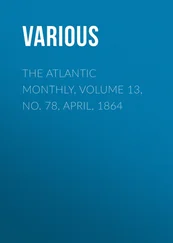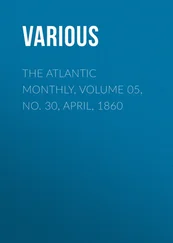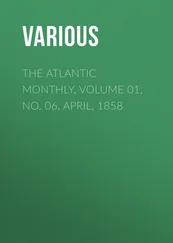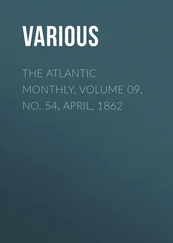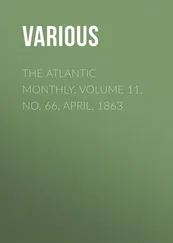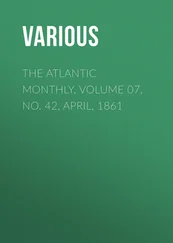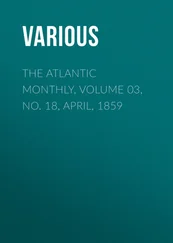Various - The International Monthly, Volume 3, No. 1, April, 1851
Здесь есть возможность читать онлайн «Various - The International Monthly, Volume 3, No. 1, April, 1851» — ознакомительный отрывок электронной книги совершенно бесплатно, а после прочтения отрывка купить полную версию. В некоторых случаях можно слушать аудио, скачать через торрент в формате fb2 и присутствует краткое содержание. Жанр: foreign_antique, periodic, foreign_edu, на английском языке. Описание произведения, (предисловие) а так же отзывы посетителей доступны на портале библиотеки ЛибКат.
- Название:The International Monthly, Volume 3, No. 1, April, 1851
- Автор:
- Жанр:
- Год:неизвестен
- ISBN:нет данных
- Рейтинг книги:3 / 5. Голосов: 1
-
Избранное:Добавить в избранное
- Отзывы:
-
Ваша оценка:
- 60
- 1
- 2
- 3
- 4
- 5
The International Monthly, Volume 3, No. 1, April, 1851: краткое содержание, описание и аннотация
Предлагаем к чтению аннотацию, описание, краткое содержание или предисловие (зависит от того, что написал сам автор книги «The International Monthly, Volume 3, No. 1, April, 1851»). Если вы не нашли необходимую информацию о книге — напишите в комментариях, мы постараемся отыскать её.
The International Monthly, Volume 3, No. 1, April, 1851 — читать онлайн ознакомительный отрывок
Ниже представлен текст книги, разбитый по страницам. Система сохранения места последней прочитанной страницы, позволяет с удобством читать онлайн бесплатно книгу «The International Monthly, Volume 3, No. 1, April, 1851», без необходимости каждый раз заново искать на чём Вы остановились. Поставьте закладку, и сможете в любой момент перейти на страницу, на которой закончили чтение.
Интервал:
Закладка:
"Natheless, gentlemen,
The anchor of your goodness us assures."
To the curious student of words and their internal senses this Dictionary is evidently a book worth having.
M. Elias Regnault has undertaken to continue the Dix Ans of Louis Blanc, in the shape of L'Histoire de Huit Ans 1840—48. Few works had ever so powerful an influence as Blanc's "Ten Years." The events of the eight years of which Regnault proposes a history were in no inconsiderable degree fruits of this work.
Mr. Hallam, on the 13th of February, sent a letter to the Society of Antiquaries, in London, announcing in consequence of his recent bereavement, he wished at the next anniversary to relinquish the office of Vice-President, which he had filled for the last thirty years; having been a member of the Society for more than half a century, and having during that period contributed many papers to its transactions. A resolution was proposed by Mr. Payne Collier, seconded by Mr. Bruce, expressive of respect for Mr. Hallam, sincere sympathy with his afflictions, and sorrow at his retirement. In a subsequent letter, Mr. Hallam stated that he should continue to be a member of the Society.
General Sir William Napier has published a new edition of his History of the War in the Peninsula—the best military history in the English language—and in his new preface he states that he is indebted to Lady Napier, his wife, not only for the arrangement and translation of an enormous pile of official correspondence, written in three languages, but for that which is far more extraordinary, the elucidation of the secret ciphers of Jerome Bonaparte and others.
In a recent number of The International we printed a poem by Charles Mackay, entitled Why this Longing? without observing that it was a plagiarism from a much finer poem by Harriet Winslow List, of Portland, which may be found in The Female Poets of America, page 354.
A descriptive catalogue of the books and pamphlets educed by the reinstitution of the Roman Catholic Hierarchy in England, would be a very entertaining work. It is astonishing how active the English become in pamphleteering when any such engrossing subject comes before the people or the parliament. The Duke of Sussex carefully preserved every thing in this shape that was printed during the discussion of Catholic Emancipation, and after his death we purchased his collection, which amounted to about seventy thick volumes , and includes autograph certificates of presentation from "Peter Plimley," and perhaps a hundred other combatants. The present discussions will be not less voluminous, and it promises to be vastly more entertaining. The matter of the holy chair of St. Peter, with the Mohammedan inscription, upon which the verd antique Lady Morgan has published two or three letters as witty and pungent as ever came from the pen of an Irishwoman, will afford pleasant material for the last chapter of her ladyship's memoirs. Warren, the author of Ten Thousand a Year , Dr. Twiss, the biographer of Eldon, Dr. George Croly, the poet, Walter Savage Landor, and Sheridan Knowles, the dramatist, are among the more famous of the disputants on the Protestant side. The author of "Virginius" professes to review Archbishop Wiseman's lectures on Transubstantiation , and the Literary Gazette says he thoroughly demolishes that dogma, which, however, "no one supposes that any Romanist of education and common sense believes. It is understood on all hands that whatever defence or explanation is offered, is only for the sake of affording plausible apology to the vulgar for a dogma which the infallibility of the church requires to be unchangeably retained. The reply of the philosophical churchman, populus vult decipi et decipiatur , is that which many a priest would give if privately pressed on the subject." The Literary Gazette makes a very common but very absurd mistake, for which no Roman Catholic would thank him. The church does maintain the doctrine, and the most "philosophical" churchman would be dealt with in a very summary manner if he should publicly deny it. The Literary Gazette adds that Knowles "displays complete mastery of the principles and familiarity with the details of the controversy," which we can scarcely believe upon the Gazette's testimony until it evinces for itself a little more knowledge of the matter.
The only one of these works that has been reprinted in this country is Landor's, which we receive from Ticknor, Reed & Fields, of Boston.
R. H. Horne, the dramatist, and author of Orion ,—upon which his best reputation is likely to rest—has just published in London The Dreamer and the Worker , in two volumes.
Mr. Roebuck, the radical member of Parliament, is continuing his History of the Whigs.
It is not be denied that Miss Martineau is one of the cleverest women of our time; deafness and ugliness have induced her to cultivate to the utmost degree her intellectual faculties, and several of her books are illustrations of a mind even masculine in its power and activity; but the constitutional feebleness, waywardness, and wilfulness of woman is nevertheless not unfrequently evinced by her, and as she grows older the infirmities of her nature are more and more conspicuous; vexed with neglect, without the kindly influences of home or friendship, without the consolations or hopes of religion, she seems now ambitious of attention only, and willing to sacrifice every thing womanly or respectable to attract to herself the eyes of the world—the last thing, in her case, one would think desirable. In the book she has just published— Letters on Man's Nature and Development, by Harriet Martineau and H. G. Atkinson —she avows the most positive and shameless atheism: Christians have had little regard for Pagan deities—she will have as little for theirs! The sun rose yesterday; the fishes still swim in the sea; all the world goes on as before; but she cares not a fig for any deities, Christian or pagan—and don't believe a word of the immortality of the soul! In this new book, of which she is the chief author, the interlocutors place implicit credence in all the phenomena of mesmerism, and they cannot believe there is any thing in man's being or existence or conscience beyond what the senses reach, beyond what the scalpel discloses in the brain. They trace acts and motions and even inclinations to the brain, and deny that there is or can be any thing in contact which can influence it. Cerebrum et præterea nihil is their motto. The book is the apotheosis of that lump of marrow and fibre. And yet this brain, which is so jealously guarded from any spiritual or immaterial influence, is declared to be completely under the direction of any man or woman who may pass a hand, with faith, backwards and forwards over the skull. The extremities of the body—the fingers—send forth and radiate certain electric, or galvanic, or invisible influences, and thus one has full power over another's organization and volition! But as to any influence beyond the sensible world, that Miss Martineau stoutly denies. The following passage is not an uninteresting specimen of this foolish production:
"I observed that under the influence of mesmerism some patients would spontaneously place their hand, or rather the ends of their fingers, on that part of the brain in action; and these were persons wholly ignorant of phrenology. In some cases the hand would pass very rapidly from part to part, as the organs became excited. If the habit of action was encouraged, they would follow every combination with precision: and if one hand would not do they would use both to cover distant parts in action at the same time. I was delighted with their effects; but did not consider them very extraordinary, because I had been accustomed to observe the same phenomena, in a lesser degree, in the ordinary or normal condition. I know some, who on any excitement of their love of approbation, will rub their hand over the organ immediately. Others, I have observed, when irritated, pass the hand over destructiveness. I have observed others hold their hand over the region of the attachments, as they gazed on the object of their affections. I have watched the poet inspired to write with the fingers pressing on the region of ideality, and those listening to music leaning upon the elbow, with the fingers pressing on the organ of music; and I catch myself performing those actions continually, as if I were a puppet moved by strings. You will observe, besides, how the head follows the excited organ. The proud man throws his head back; the fine man carries his head erect; vanity draws the head on one side, with the hat on the opposite side; the intellect presses the head forward; the affections throw it back on the shoulders; and so with the rest."
Читать дальшеИнтервал:
Закладка:
Похожие книги на «The International Monthly, Volume 3, No. 1, April, 1851»
Представляем Вашему вниманию похожие книги на «The International Monthly, Volume 3, No. 1, April, 1851» списком для выбора. Мы отобрали схожую по названию и смыслу литературу в надежде предоставить читателям больше вариантов отыскать новые, интересные, ещё непрочитанные произведения.
Обсуждение, отзывы о книге «The International Monthly, Volume 3, No. 1, April, 1851» и просто собственные мнения читателей. Оставьте ваши комментарии, напишите, что Вы думаете о произведении, его смысле или главных героях. Укажите что конкретно понравилось, а что нет, и почему Вы так считаете.
